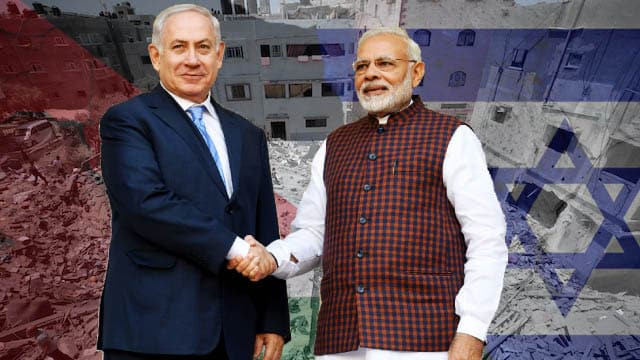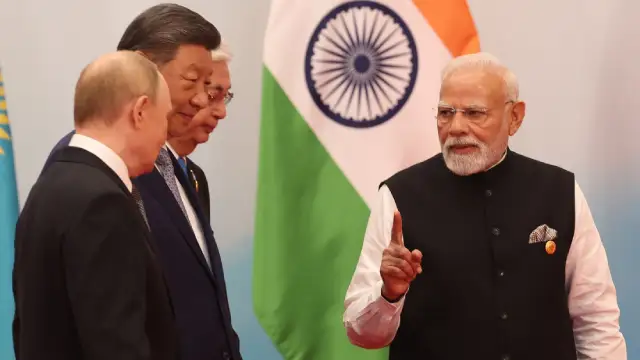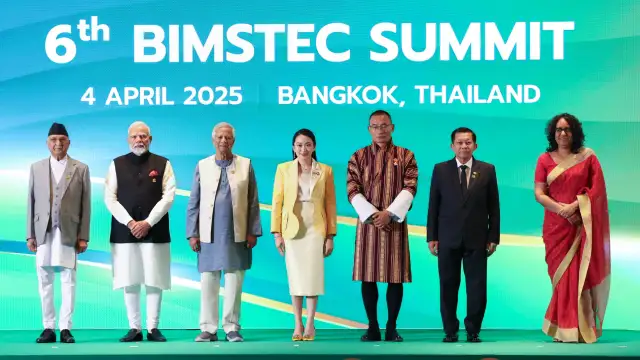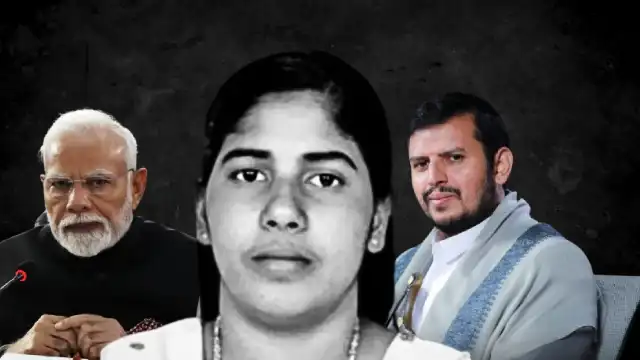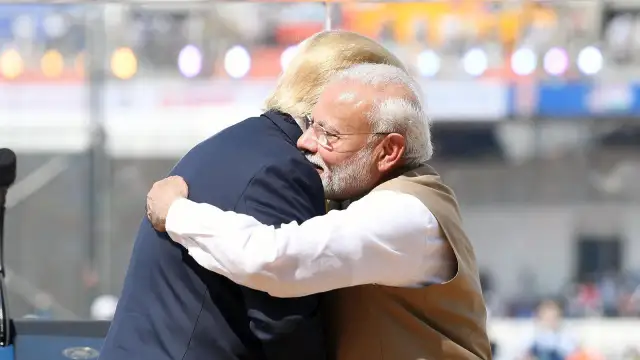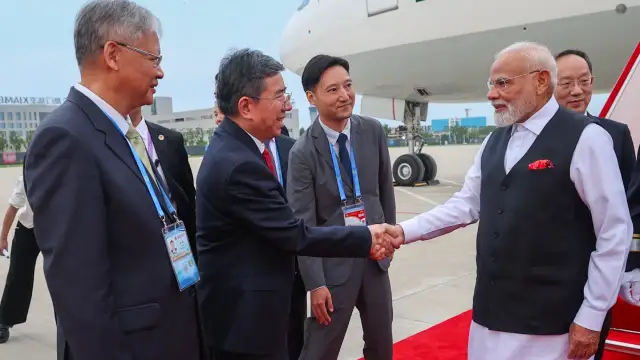It’s now a year since West Asia has seen huge flames of genocidal violence initiated by Israel engulf Gaza and beyond. In this scenario, India’s stance on Gaza and West Asia has been one of the most inconsistent ones in the world, especially among the members of the BRICS+ members. Recent developments exemplify that India’s foreign policy stance on West Asia has not just been inconsistent but is also full of duality, indicating shortcomings that Prime Minister Narendra Modi’s government has been trying to conceal.
What’s problematic in India’s stance on Gaza and West Asia?
From the very onset of the conflict, India’s ruling far-right dispensation has tried to portray the October 7th attacks by Hamas as an act of “terror” and the catalyst of the catastrophe that followed, without highlighting the context of the attacks and the seven-decade-long occupation of Palestine that New Delhi itself has officially opposed.
Soon after Hamas’s October 7th Operation Al-Aqsa Flood, Mr Modi explicitly exhibited support for Israel, shifting from India’s traditional position of calling both parties to restraint and promoting the idea of a peaceful resolution of the issues to create an independent Palestine with East Jerusalem as its capital.
Although India took a u-turn within a week, facing the heat in the Middle East and gauging the damage it could do to the US-backed proposed India-Middle East-Europe Economic Corridor (IMEC) project, which will connect India with the European market and vice-versa through the UAE, Saudi Arabia, Jordan and Israel, the damage was already done to its image in West Asia and beyond.
Yet, from the BRICS leaders’ meeting onwards—held virtually amid the genocide in November 2023, skipped by Mr Modi and attended by External Affairs Minister S Jaishankar—India refused to acknowledge Israel’s actions in Gaza as an act of genocide and focused on only on condemning the October 7th attacks and demanding a peaceful two-state solution that India’s close ally Israel has openly rejected.
Eventually, as the attacks engulfed West Asia, as Israel started attacking Lebanon, another country India has good relations with, Mr Modi’s government chose to remain silent and didn’t utter a word. There has been no condemnation of the Israeli bombing of Lebanon by the Ministry of External Affairs (MEA).
India’s stance on Gaza and West Asia, its selective outrage and pro-Zionist bias have turned mass opinion in these countries against it, affecting traditional delicate ties and threatening years of hard work by the MEA to establish India as a friend of the Arab people.
The boisterous Hindutva-incensed social media troll army affiliated with Mr Modi’s ruling Bharatiya Janata Party (BJP) has also helped worsen the situation for India.
Meanwhile, the MEA’s strong reaction to Iran’s supreme cleric’s remarks on Indian Muslims’ plight has also caused fissures in traditional and strategic ties for New Delhi.
In this situation, what could save New Delhi’s interests in the region is a two-pronged approach that has been lately visible as a damage-control measure.
India’s two-pronged approach
The Persian gamble
While India’s stance on Gaza and West Asia has drawn flak both at home and abroad, especially from the Arab people of the Middle East, New Delhi has also been engaging in track-two diplomacy to do damage control and ensure that its ties with India’s traditional allies in the region are sustained despite Mr Modi’s tryst with the Zionist forces.
In a significant move, Indian Navy’s INS Tir, INS Shardul and Indian Coast Guard’s ICGS Veera docked at the southern Iranian port of Bandar Abbas on September 30th, as tensions between Iran and Israel escalated. The deployment was for long-range training, according to the Indian Navy, in the Persian Gulf.
“During the visit, the ships will engage in activities aimed at enhancing maritime security and interoperability between Indian Navy and IRI Navy. Professional exchanges, cross training visits, wreath laying, friendly sports fixtures and Maritime Partnership Exercise (MPX) are planned during the ship’s stay (sic),” the Indian Ministry of Defence said in a statement.
“Earlier, the Iranian Training Flotilla ships Bushehr and Tonb had visited Mumbai in Mar 24 as part of training interaction. IRI Naval Ship Dena had also participated in the multi lateral Naval Exercise MILAN 24 in Feb 24. The extant visit underscores India’s commitment to maritime cooperation with regional states in line with the vision of SAGAR (Security & Growth for All in the Region) (sic),” it added.
The three ships remained in Iran even when the latter fired its missiles targeting Israel. There have been speculations that Israel wants to retaliate and it has informed India about the decision as the Indian Navy ships remain in the territory of Iran. However, India only moved the three ships to Oman on October 6th.
India’s naval exercise in the Persian Gulf can be termed routine but it bears significance due to two reasons—Israel’s aggression in West Asia and India’s tensions with Iran following the MEA’s condemnation of the supreme leader.
Damascus tango
While India’s far-right BJP supporters and leaders lambast India’s traditional West Asian ally Iran and its allies for resisting Israel’s genocide, India has been consistently pursuing diplomatic endeavours to enhance India’s ties with Syria, which has an antagonistic relationship with Israel and has been facing incessant attacks from the Israeli occupation forces.
Recently, Mr Jaishankar held a one-to-one meeting with Syrian Foreign Minister Bassam Sabbagh at the sidelines of the United Nations General Assembly in New York. Soon after Mr Jaishankar’s meeting with Mr Sabbagh, Syrian Prime Minister Ghazi Al-Jalali discussed with Indian Ambassador to Syria Irshad Ahmed ways to enhance Syria-India cooperation and bilateral ties in various sectors.
India has been showing interest consistently in developing its ties with Syria, despite Israeli threats, which point towards a duality in the Indian foreign policy approach.
What’s behind India’s double-edged foreign policy?
Economic compulsion is one of the major causes of India’s double-edged foreign policy. One of the major reasons behind this, apart from India’s export interests to the US, is the financial interests of India’s big corporate houses in the West, where they have large exposures.
According to experts, Indians have a direct investment of $6bn in the US stock market, and the total investment amounts to $10bn. Moreover, the top 100 Indian companies have invested over $40bn in the US market and created over 425,000 jobs in over 50 states.
Though Israel doesn’t feature among the top 30 trading partners of India in 2023-24, there are several projects that tie both together, especially in the defence sector.
Mr Modi’s dispensation strongly believes that the future lies with the US-led collective West, its satellites like Israel and military blocs like Quad. India’s border disputes and tense relations with China are the reasons behind this pro-western tilt.
To highlight its ties with the US and its allies, India is hosting the ten-day Malabar Exercise of the Quad member nations’ naval forces from October 8th to October 18th at Vishakhapatnam, apparently aiming at intimidating China.
Therefore, while India participates in multilateral institutions like BRICS+ and the Shanghai Cooperation Organization (SCO), it remains indifferent towards most of the agendas of these blocs. India is opposed to the idea of a comprehensive security structure created by China and Russia to take on the US-led “rules-based order”.
Despite circumventing the US-led collective West’s sanctions on Russia and trading with it in local currency, India isn’t supportive of the idea of de-dollarisation, which is gaining currency in the global south.
But India also needs the global south as its big businesses need expansion to the Middle East and Africa, as well as South East Asia. India needs its energy security and also the security of its cargo travelling through the restive Gulf of Adens region of the Red Sea.
Hence, it needs the support of Iran, despite Israel’s unliking and also needs relations with the Arab countries that are friendly to the US and Israel like the UAE.
However, this opportunist trapeze walk isn’t considered pragmatic multilateral pragmatism, but sheer opportunism by most of the stakeholders who have been striving for multipolarity. India’s problematic foreign policy stance on West Asia and its reliance on the West won’t help it secure its long-term interests in the crucial Middle East.
India’s gamble on Israel’s survival and victory, and its reliance on the US’s supremacy may even close the doors of opportunities that it can explore now and in the future.
Join our channels on Telegram and WhatsApp to receive geopolitical updates, videos and more.

